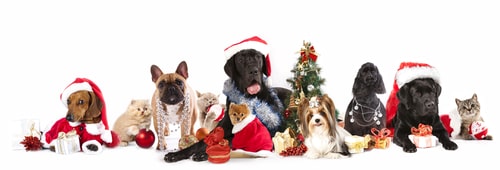So here’s a few things to look out for this Christmas. What to keep locked up out of reach. And what to do if your pet eats something harmful.
High risk food hazards for dogs and cats
Mince pies, Christmas cakes, Christmas pudding, tinned or fresh grapes.
- Grapes, raisins, sultanas, and anything that contains them are all very harmful to dogs and cats.
- It may only take a single raisin to cause life-threatening kidney failure. It sounds hard to believe, but vets at Joii have known this to happen.
- Symptoms start within 24 hours and include loss of appetite, vomiting, diarrhoea, extreme tiredness and tummy pain.
- Every year Joii vets and nurses receive many calls from anxious pet parents whose pets have eaten things like Christmas mince pies.
- Call a vet immediately if your pet eats anything containing grapes, raisins or sultanas!
Anything containing chocolate!
- Selection boxes, chocolate bars, Christmas tree decorations, cocoa, truffles, Yule Logs and tinned chocolates.
- Chocolate and cocoa powder contain theobromine. Theobromine is very toxic for dogs and cats.
- Chocolate can cause life-threatening damage to the heart, nervous system and kidneys.
- The level of risk depends on the type of chocolate your pet eats and how much. Dark chocolate contains more theobromine than milk. The stronger the dark chocolate, the greater the risk.
- Early symptoms include restlessness, excitement, drinking more, and vomiting. Followed by breathing difficulties and collapse.
- Call a vet immediately if your pet eats anything chocolatey.
Sugar-free gum, sweets, low-sugar or sugar-free jams, and jellies
- These human foods contain xylitol. Xylitol is a sugar substitute increasingly found in many human foods and medicines. And it’s getting used more and more. Because as well as being low calorie, xylitol reduces formation of tooth-rotting acids by bacteria in the mouth
- But dogs who eat anything containing xylitol get sick within minutes. It makes their blood sugar fall dramatically. A bit like a sudden overdose of insulin.
- Early symptoms include vomiting, unsteadiness, sleepiness, not eating, tremors, and fits.
- Can cause life-threatening liver damage if your dog eats a lot.
- Call a vet immediately if your pet eats anything that may contain xylitol!
The Christmas turkey
- Salmonella is a food-poisoning bacteria frequently found on raw or undercooked turkey and chicken.
- Raw and undercooked poultry risks salmonellosis. Both humans and pets are at risk.
- Symptoms include loss of appetite, fever, vomiting, tummy pain, diarrhoea – sometimes with blood
- Turkey bones, raw or cooked, are a hazard to pets.
- Cooked bones can splinter. The sharp pieces can cause serious injury as they pass through the intestine.
- Call a vet immediately if your pet eats raw turkey or anything with bones!
Alcohol
- Cooking sherry, whisky, Baileys, wine, cocktails, liqueurs, trifles etc.
- Alcohol in all its forms is harmful to pets
- 1 teaspoonful can cause poisoning in cats and dogs
- Symptoms can include vomiting, dizziness, unsteadiness, drinking more water, and breathing difficulties
- Surprising sources of alcohol would include fermenting fruit and bread dough.
- Call a vet immediately if your pet eats or drinks something containing alcohol!
Uncooked bread dough
- Many people at home for the holidays will take the opportunity to make delicious home-baked bread.
- A word of caution: bread dough is very dangerous for dogs and cats.
- The dough expands in the stomach, causing serious tummy bloating. It can even trigger a twisted stomach (GDV) in dogs. GDV is life-threatening.
- Symptoms include agitating, pacing, distended tummy, retching, and collapse.
- Yeast in the dough causes fermentation inside your pet’s stomach, producing lots of alcohol and symptoms of alcohol poisoning.
- Call a vet immediately if your pet eats uncooked bread dough!
Moderate risk hazards for dogs and cats
Onion, garlic and other members of the allium family
- Sage and onion stuffing, soup ingredients, and vegetable accompaniments
- Onions, garlic, leeks and chives all belong to a group of plants called alliums
- Cooked or raw, these can cause severe tummy upsets, tiredness, weakness, breathing problems, and collapse.
- Eating more than 15-30 mg/kg can cause damage to your pet’s blood cells – jaundice (yellow eyes and gums) and anemia within 2-5 days.
Nuts
- Chestnut stuffing, bowls of nuts and nut roasts.
- Macadamia nuts and chestnuts can be harmful to dogs
- Symptoms depend on how much is eaten and include tummy upsets, nervous symptoms, muscle weakness, abnormally high body temperature, and breathing problems.
- Very high doses may cause kidney damage.
- Whole nuts are also a choking hazard. Or risk getting stuck in the intestine – which means a major operation to remove them.
What to do if your pet eats something they shouldn’t this Christmas:
- Stay calm
- Prevent them eating any more
- Phone your vet or emergency out-of-hours service without delay
And yes, I do mean without delay. Your vet can give your pet an injection to empty their tummy. Problem gone! But this injection has to happen within an hour or two of eating something bad.
If you’re not sure what’s harmful or what to do next, Joii can help.
- Experienced Joii vets and nurses are on-hand 24/7, 365 days a year
- Download the app and call us anytime for support or advice if your pet has become unwell or made some poor life choices in their eating habits!
The Pet Poison Helpline is also available with expert advice on poison risks. There is a small charge for this service.
You’ll also find lots more information on the app about the common illnesses that can affect your dog or cat and the signs to look out for.
And let’s make sure everyone has a safe and happy festive season.

Coming soon….on the third day of Christmas
Too much turkey and treats? Festive tummy upsets











